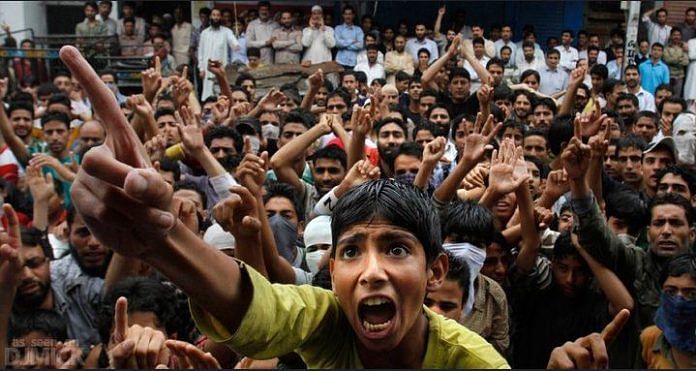In the past eight months, India has curbed internet access 42 times to control volatile conditions across 11 states, says Software Freedom Law Centre. There were only six curbs in all of 2014.
The office of UN High Commissioner for Human Rights termed the bans on mobile internet services in Kashmir “collective punishment”. The ban of internet was also used to stem the Patidar agitations in Gujarat, Jat reservation riots in Haryana and Gorkhaland protests.
Is switching off the internet the only way to restore peace during violent protests? We ask experts.
#
The policy approach to internet censorship right now is proceeding with secrecy
 Apar Gupta, advocate, free speech and privacy campaigner
Apar Gupta, advocate, free speech and privacy campaigner
There exist two independent powers for internet censorship, which are being used indiscriminately by the government. This trend is only growing and is a matter of great concern for entrepreneurs, civil society and internet users. The first power is for blocking individual websites which has existed since 2009, but is now being used not only to block political criticism of specific Twitter handles, but also trends and hashtags. There is a complete absence of transparency in this process and no reasons are offered to explain why such censorship is being conducted.
The second more pervasive power are internet shutdowns which are being indiscriminately imposed across India. The recently issued Temporary Suspension of Telecom Services (Public Emergency of Public Safety) Rules, 2017, have legitimised the power of enforcing a complete internet shutdown. This amounts to a disproportionate infringement of the right to speech and the right to know. India stands as a global exception having the highest number of shutdowns in 2016 followed by conflict zones such as Iraq and Syria.
For those who think such orders have been passed only for law and order issues, will be surprised to know such orders have also been passed to prevent cheating in exams and to prevent crowds on Ganesh Chaturthi celebrations.
Over three months ago, 18,000 people and about 100 organisations signed a petition called ‘Keep Us Online’ asking the government to open a public consultation on this issue. The government has also said repeatedly in Parliament that it does not have any official statistic or data on the number of shutdowns. The policy approach to internet censorship right now is proceeding with secrecy, which is causing immense damage to civil liberties and to the internet economy. It is my fear we may be slowly stepping towards China style censorship.
#
Any obstacle in communication does play a role in making street violence less effective
 Lt Gen Syed Ata Hasnain (Retd)
Lt Gen Syed Ata Hasnain (Retd)
A common phenomenon witnessed in all internal security (IS) situations in India is that the local authorities invariably ensure that service providers for the world wide web switch of public access to all communication, both on mobile networks and fixed lines. The purpose ostensibly is to prevent free flow of negative information, disallow terror, militant or anti-national networks to have situational awareness on a near real-time basis and prevent rabble-rousing.
Social media was used as a prominent tool during the Arab Spring to mobilise flash mobs and protesters to unnerve the authorities. The authorities here restrict access in order prevent the replication of such strategies.
Technology today is not restricted to service provider aided internet. Virtual Private Networks (VPN) are known to bypass normal commercial channels. With alternative networks, which also service the dark web, are available, is there much use in switching off the service provider aided internet? That is the moot issue which security authorities are now debating.
Ordinary people have little proclivity towards delving into new technology. But wherever the agitators and anti-national forces exist, the security authorities have to ensure that there are sufficient obstacles to effective communication. Some will argue that such arbitrary acts also adversely affect people who support the establishment, and that counter-propaganda to neutralise the rabble-rousers becomes difficult.
But in the Kashmir street turbulence, any obstacle in communication does play a role in making such protests less effective.
#
Snapping internet leads to rumour-mongering in the Valley and kills ‘authentic’ news
 Daanish Bin Nabi, Op-ed/Online Editor at Rising Kashmir
Daanish Bin Nabi, Op-ed/Online Editor at Rising Kashmir
The state of Jammu & Kashmir has witnessed more internet shutdowns than any other state of India in the recent past. According to reports, there have been “over 2,920 hours without access” since the killing of Hizb commander Burhan Muzaffar Wani in July 2016 in Jammu Kashmir. The state government snaps the internet every other day to stop the civilian population from coming out to vent their anger against what they called “occupation” forces.
Has the internet gag helped in calming down the situation in Kashmir? Certainly not. The stone-throwing, in every nook and corner of the Valley, does take place, so do the rallies that are taken out whenever any militant is killed during a gunfight with the state government forces.
The worst sufferers of the internet shutdown remain the business community and the students in Kashmir. There are a number of new business ventures that have come up in the Valley with online customers. They suffer huge losses when the internet is taken down.
Students suffer because most schools put the syllabus and activity schedule online. Internet gag severely affects our online news readership, as hits and shares plummet. It also affects our online advertisements and we do not get paid for the days the internet remain suspended.
Most importantly, the snapping of internet has paved way for rumour-mongering in the Valley and the “authentic” news gets killed.
#
Shutdowns affect government services at a time when there is a push to transfer services online under ‘Digital India’
 Osama Manzar, founder Digital Empowerment Foundation India
Osama Manzar, founder Digital Empowerment Foundation India
With the advent of the internet, exercising free speech, expression, association and assembly have become much easier.
The Digital Empowerment Foundation has recorded 116 internet shutdowns across 18 states in India from 2012 to 2017. These shutdowns are a threat to human rights and affect us all in our increasingly digitalised lives. The government imposes shutdowns for various reasons, mostly to safeguard national security and maintain law and order. However, even government services are negatively affected during the shutdowns, especially at a time when there is a major push by the government to transfer almost all of its services online and promote ‘Digital India’.
Jammu & Kashmir has witnessed 55 shutdowns in the past five years followed by Rajasthan with 14 shutdowns. Darjeeling district in West Bengal has been living under an internet shutdown for over 90 days and it continues.
Of the 116 incidents, more than 30 incidents were meant to prevent deterioration of law and order. More than 45 incidents occurred as a precautionary measure to avoid spread of rumours in the area. People were informed prior to the network shutdown in less than 10 cases.
The situation in West Bengal and Madhya Pradesh clearly proves that shutdowns were ordered to prevent protests against the government.
If shutdowns are for longer duration, it affects people psychologically and economically. In Jammu & Kashmir, the sentiments of people range from frustration to anger, helpless, isolation, panic and listlessness. This shows that switching off the network does not mean that peace is maintained but it turns into a collective punishment for citizens, and causes social isolation and despair.



